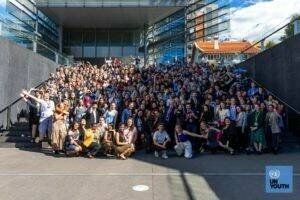Nola contributes to youth perspective on public policy
The National Commission supported Nola Smart to participate in UN Youth’s Aotearoa Youth Declaration conference.
Nola reports back
Held over four days, Year 8-13 rangatahi gather from across New Zealand for a civic education conference. The conference convenes to write the Aotearoa Youth Declaration which is a document that provides a youth perspective on public policy. Rangatahi use their knowledge to come up with policy solutions in various areas. However, this is far from the only outcome of the conference; it is all about upskilling participants to be change-makers, helping youth find the issues they are passionate about and motivating them to become conscientious citizens. The declaration also highlights the tools we can use to engage with elected representatives of our communities.
With the conference itself held in Auckland, with support from the National Commission, there were regional hui before the event to capture a more representative youth voice, and a scholarship programme allowed a diverse range of participants to attend the Auckland conference from these hui and elsewhere.
The success of the event is in its thoroughness. Attendees came together in rōpū (groups) to discuss relevant issues in particular topic areas. There were 22 rōpū: accessibility, climate action, culture and diversity, economic development, education, environment, equity, gender equality, governance, hauora, healthcare, heritage, housing, infrastructure and transport, international relations, justice, media and representation, science, social development, technology and innovation, youth development, and youth wellbeing. The exhaustive list reflects the far-reaching scope of the mahi the students undertook.
To facilitate students in their discussions, each rōpū undertook outreach to an organisation in a relevant area. For example the housing rōpū gained insight from visiting housing for humanity while another rōpū went to Auckland Transport. This grounded their knowledge with real-life issues and solutions. Furthermore, students had access to industry speakers and all participants went to panel discussions and workshops on tikanga, civics, identity, regional action and active citizenship.
The final hours of the conference saw presentations of the rōpū solutions/actions to an exterior audience of influencers and decision makers. I was lucky enough to tag along to the presentations by the climate action, environment, infrastructure and housing, healthcare, housing and international relations rōpū. While at first I thought that these specific rangatahi showed wisdom, innovation and insight beyond their years I realised that in fact this is the real youth voice, but with it so often overlooked we lose appreciation of the strength of their input. It was a valuable display of the uncaptured knowledge the younger generations of New Zealand have.
But their mahi is far from over; the coming weeks and months will see the rangatahi spread the youth declaration report to decision-makers in their regions to help them decide the future of Aotearoa New Zealand.

